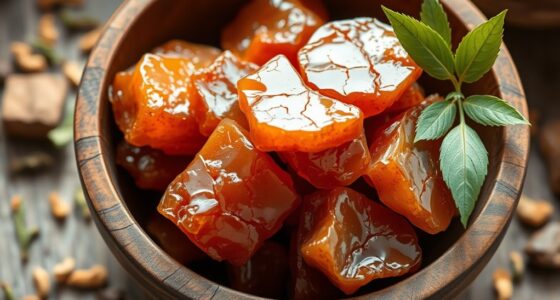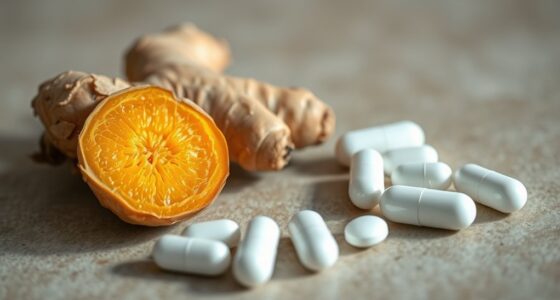Herbal anti-inflammatories like turmeric, ginger, boswellia, and green tea can offer supportive relief for autoimmune conditions such as rheumatoid arthritis. They help reduce inflammation and may improve joint comfort, but they shouldn’t replace your medical treatments. Quality is key, and you should always consult your healthcare provider before adding herbs, especially if you’re on medications. If you want to discover how these herbs fit into a holistic approach, there’s more to explore that could benefit your health.
Key Takeaways
- Certain herbs like turmeric, ginger, boswellia, and green tea contain compounds that may reduce inflammation in autoimmune conditions such as RA.
- Herbal anti-inflammatories can support overall management but should complement, not replace, medical treatments.
- Quality and proper dosing of herbs are crucial for safety and effectiveness; consult healthcare providers before use.
- Individual responses vary; personalized guidance ensures herbs are used safely alongside conventional therapies.
- Incorporating traditional plants may help alleviate symptoms and support immune balance when used responsibly.

Autoimmune inflammation occurs when your immune system mistakenly attacks your own tissues, leading to chronic pain, fatigue, and other health issues. If you’re exploring natural ways to manage this condition, herbal anti inflammatories might offer some relief. These are compounds found in traditional medicinal plants that have been used for centuries to reduce inflammation and support overall health. While they shouldn’t replace your medical treatments, incorporating certain herbs may help ease symptoms and improve your quality of life.
Many traditional medicinal plants are known for their anti-inflammatory properties. Turmeric is one of the most well-known, thanks to its active compound, curcumin, which has been shown to inhibit inflammatory pathways. You might consider adding turmeric to your diet, whether in cooking or as a supplement, but be sure to discuss this with your healthcare provider. Similarly, ginger contains compounds called gingerols that can help decrease inflammation and pain, making it a useful addition to your daily routine. You could brew ginger tea or include fresh ginger in your meals for ongoing benefits.
Adding turmeric and ginger to your diet may help reduce inflammation and ease autoimmune symptoms.
Other herbs with notable anti-inflammatory effects include boswellia, also known as frankincense. Traditionally used in Ayurvedic medicine, boswellia has demonstrated the ability to reduce joint inflammation and stiffness, especially in conditions like rheumatoid arthritis. You might find it in supplement form, but again, consult your doctor beforehand. Green tea is another traditional medicinal plant that offers anti-inflammatory benefits thanks to its high levels of polyphenols, which can help modulate immune responses and reduce inflammation. Additionally, choosing high-quality herbal products is important because product quality impacts efficacy.
It’s important to remember that herbal remedies can be powerful, but they’re not a cure-all. They work best as part of a holistic management plan that includes conventional treatment, lifestyle adjustments, and dietary changes. When considering herbal anti inflammatories, focus on quality and sourcing—use reputable brands or consult with a herbalist to ensure safety and efficacy. A balanced approach that combines traditional medicinal plants with your medical care can help you better manage autoimmune inflammation.
While herbs like turmeric, ginger, boswellia, and green tea have promising anti-inflammatory effects, keep in mind that individual responses vary. Some herbs may interact with medications or cause side effects, so it’s essential to discuss your plans with a healthcare professional. With patience and proper guidance, herbal anti inflammatories could become a valuable part of your strategy to tame autoimmune inflammation and regain more control over your health.
Frequently Asked Questions
Are There Any Proven Clinical Trials Supporting Herbal Treatments for RA?
You might wonder if clinical trials support herbal treatments for RA. While some studies suggest certain herbs can reduce inflammation, the results often vary due to herbal supplement quality and differences in traditional healing practices. It’s crucial to choose high-quality herbs and consult with healthcare professionals. Though promising, more rigorous research is needed to confirm herbal treatments’ effectiveness for RA, so approach them as complementary options rather than primary cures.
Can Herbs Replace Conventional Medications for Autoimmune Inflammation?
Sure, herbs might sound like a miracle cure, but don’t kid yourself—you can’t replace your medication with a tea. While herbal safety is essential, many herbs can interact with your meds, making things worse. Relying solely on herbs for autoimmune inflammation is risky and can delay proper treatment. Always consult your doctor before mixing herbs with your ongoing medication to avoid unintended consequences.
Are Herbal Remedies Safe for Long-Term Use in Autoimmune Conditions?
You’re wondering if herbal remedies are safe for long-term use in autoimmune conditions. While herbal safety varies depending on the herb, many are generally safe when used appropriately, but long-term efficacy isn’t always guaranteed. You should consult with a healthcare professional to guarantee safe use over time. Regular monitoring helps assess effectiveness and any potential side effects, ensuring you get the most benefit without risking your health.
How Do Herbs Specifically Modulate Immune System Responses?
When you ask how herbs help, you’re exploring their ability to influence immune cell modulation and cytokine regulation. Herbs actively alter immune responses by calming overactive immune cells and balancing cytokine production. They can suppress harmful inflammation and promote healthier immune activity. By supporting immune harmony, herbs help reduce autoimmune flare-ups, making your body better equipped to manage conditions like RA naturally and effectively.
Which Herbs Are Most Effective for Reducing Autoimmune-Related Joint Pain?
You can reduce autoimmune-related joint pain by exploring herbs like turmeric, ginger, and boswellia. To maximize their benefits, use herbal preparation methods such as teas, tinctures, or capsules. Integrate traditional medicine practices with modern approaches for better results. Consistent use, combined with a balanced diet and lifestyle changes, may help alleviate pain and inflammation naturally. Always consult a healthcare professional before starting any herbal regimen.
Conclusion
While herbs offer promising relief, remember that they aren’t a magic potion—think of them as your trusty medieval healer’s herbs, not a cure-all like the legendary elixir of youth. Always consult your healthcare provider before trying new remedies, and combine herbal support with modern treatments. With patience and proper care, you can tame autoimmune inflammation and regain control of your health, just as warriors of old relied on their trusted herbs to face formidable foes.










